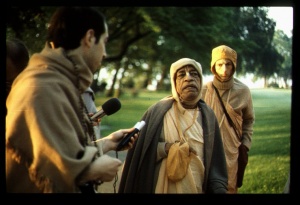CC Adi 16.102 (1975)

A.C. Bhaktivedanta Swami Prabhupada
Below is the 1996 edition text, ready to be substituted with the 1975 one using the compile form.
TEXT 102
- doṣa-guṇa-vicāra—ei alpa kari’ māni
- kavitva-karaṇe śakti, tāṅhā se vākhāni
SYNONYMS
doṣa-guṇa-vicāra—therefore to criticize one’s poetry as good or bad; ei—this; alpa—negligible; kari’—making; māni—I consider; kavitva—poetic ingenuity; karaṇe—in performing; śakti—power; tāṅhā—that; se—we; vākhāni—describe.
TRANSLATION
“Such mistakes should be considered negligible. One should see only how such poets have displayed their poetic power.
PURPORT
In Śrīmad-Bhāgavatam (SB 1.5.11) it is said:
- tad-vāg-visargo janatāgha-viplavo
- yasmin prati-ślokam abaddhavaty api
- nāmāny anantasya yaśo ’ṅkitāni yat
- śṛṇvanti gāyanti gṛṇanti sādhavaḥ
“In explaining the glories of the Lord, inexperienced men may compose poetry with many faults, but because it contains glorification of the Lord, great personalities read it, hear it and chant it.” Despite its minute literary discrepancies, one must study poetry on the merit of its subject matter. According to Vaiṣṇava philosophy, any literature that glorifies the Lord, whether properly written or not, is first class. There need be no other considerations. The poetic compositions of Bhavabhūti, or Śrīkaṇṭha, include Mālatī-mādhava, Uttara-carita, Vīra-carita and many similar Sanskrit dramas. This great poet was born during the time of Bhojarāja as the son of Nīlakaṇṭha, a brāhmaṇa. Kālidāsa flourished during the time of Mahārāja Vikramāditya, and he became the state poet. He composed some thirty or forty Sanskrit dramas, including Kumāra-sambhava, Abhijñāna-śakuntalā and Megha-dūta. His drama Raghu-vaṁśa is especially famous. We have already described Jayadeva in Chapter Thirteen of the Adi-līlā.